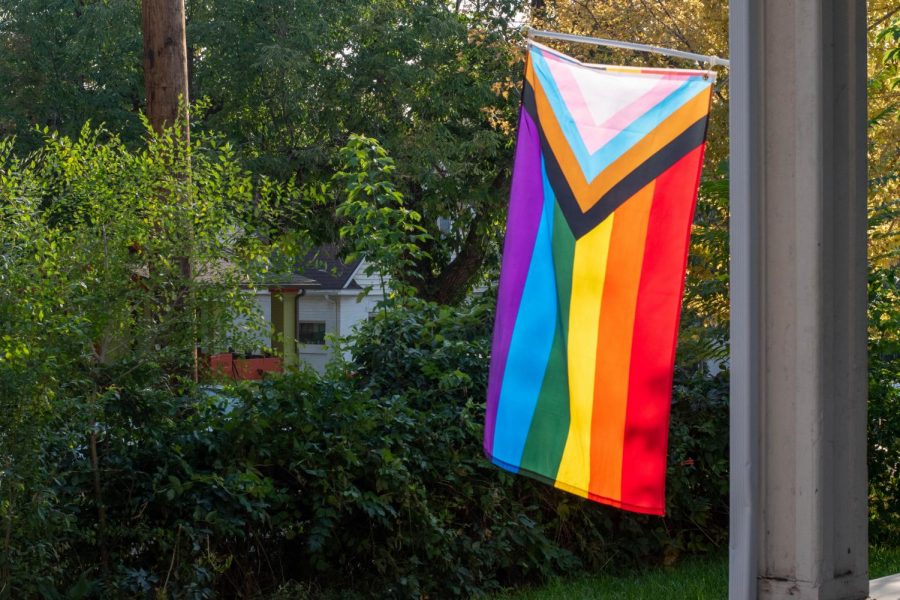Trans U Student Finds Solace and Love Despite Harmful Legislation
A pride flag hangs from a house in Salt Lake City, Utah on Sept. 21, 2020. This design of the pride flag includes Black, Brown and trans pride. (Photo by Gwen Christopherson | The Daily Utah Chronicle)
September 8, 2021
In the 2021 legislative session, Utah politicians proposed two bills regarding transgender people, both of which did not pass the House’s attempt to file for a bill.
The first, House Bill 302, would ban trans girls specifically from playing in girls sports. The second, House Bill 92, would make it “unprofessional conduct to perform a medically unnecessary puberty inhibition procedure or a sex characteristic-altering procedure” on a person 16 and younger in Utah. This means trans kids could not receive hormone blockers, hormonal prescriptions or any sort of cosmetology procedures until after the age of 16, even with parental consent.
H.B. 302 discusses the “advantage” transgender girls have over cisgender girls.
According to Scientific American, transgender youth experience high rates of bullying, anxiety and depression which make it difficult to train and compete.
Transgender girls on puberty blockers have a negligible level of testosterone, while women with polycystic ovarian syndrome, a health condition that produces excess amounts of testosterone, are allowed to compete and make up about 10% of women.
“One study of professional male triathletes found no relationship between testosterone levels and performance,” said Sara Chodosh in an article for Popular Science. “Another, looking at professional cyclists, found the same lack of correlation. Yet another, comparing cyclists, weightlifters, and controls to each other on a cycling test, found a negative correlation between testosterone levels and performance.”
Aria Burk, a transgender woman attending, working and researching at the University of Utah, said society is a hindrance on transgender lives. She speaks of the ideas that are pushed upon her — expectations of a trans person and the difficulties of the expectations of being born a boy.
Burk, however, has found solitude and stability in her relationship with Ali Myers, who identifies as queer.
“There was never any sort of divide,” Myers said. “It’s incredible how much love for a person can tie into self-love.”
Through the process of these bills and other challenges, the two have united to help each other in their experiences.
Burk said she had a lack of interest in sports because of bullying.
“A lot of my negative experiences in terms of bullying happened in the locker room,” Burk said.
According to Burk, the government is not listening to the community these bills are truly affecting. She said they are not centering their motives around the needs or wants of women, but instead around something else entirely.
Additionally, Burk explained a lot of time and thought went into her transition process, and it wasn’t without difficulty. She spoke of how much trauma has come from being misgendered and expressed the importance of treatments.
Myers said one’s sex at birth has nothing to do with gender expression. They discussed how the binary seems to be a made-up concept to fit people into boxes of society.
“If we flipped this conversation and put a boy in a dress, how humiliating would that be for him?” Burk said. “What we’re talking about is a matter of humiliation and protection in a lot of ways.”
Burk said she felt “existential dread” before beginning her transition and expressed that there are great struggles that come with presenting a wrong identity.
Both Myers and Burk identify the importance of found families and the subcultures that have opened up to accept their identities. The two have helped each other to feel accepted.
Myers said the biggest lesson she has learned is to accept people in their full context, not simply a small sense of a person.
“[Burk] shows so much love despite how little is shown for them,” Myers said.








